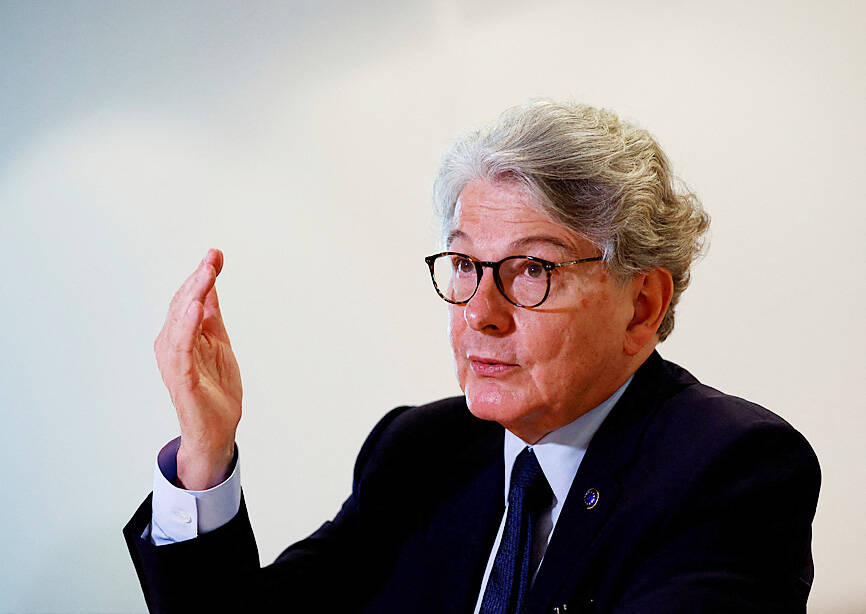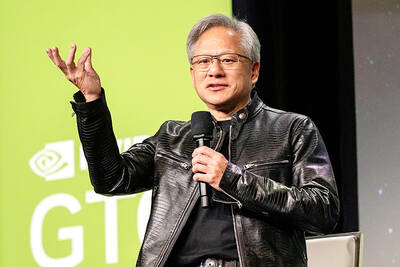Japan and the EU agreed to step up cooperation on semiconductors a day after China unveiled export restrictions on two metals crucial to some parts of the chip industry, adding to tensions in a global technology trade war.
The two sides agreed to an “early warning” system on problems in the chip supply chain in a memorandum that was to be signed by Japanese Minister of Economy, Trade and Industry Yasutoshi Nishimura and European Commissioner for the Internal Market Thierry Breton at a meeting in Tokyo yesterday.
China’s announcement of new controls on gallium and germanium, which are used in the semiconductor, telecommunications and electric-vehicle industries, is the latest reminder of vulnerabilities in the chip supply chain.

Photo: Reuters
Beijing says its export controls are in accordance with law and are not targeted at any specific country, Chinese Ministry of Foreign Affairs spokeswoman Mao Ning (毛寧) said yesterday.
The US, Japan and EU members are among the governments aiming to bring more chip production home to bolster resilience and restrict some related exports to China. They are also working to shore up ties with a broader range of partners.
The pact outlines plans for information-sharing on government subsidies as well as cooperation on research and development of next-generation chips and developing human resources.
Japan in May agreed to deepen cooperation with the US on advanced semiconductor research.
Japan is funneling billions of dollars into subsidizing domestic semiconductor ventures backed by Taiwanese, Japanese and US firms, as well as backing a buyout of JSR Corp, a world leader in manufacturing chipmaking compounds.
Nishimura yesterday said that Tokyo would watch how China implements planned export restrictions on germanium and gallium and seek answers on the intent behind the move.
“If any measures are unfair toward Japan in light of international rules such as those under the WTO, we will act accordingly,” Nishimura told reporters at a regular news conference.
Tokyo does not consider China’s curbs as a reaction to Japan shoring up its licensing requirements on chipmaking equipment, he said.
In Taipei, the Ministry of Economic Affairs said the short-term effect of China’s export controls on germanium and gallium would not be significant.
Taiwan is monitoring the effects on global markets of long-term controls, as well as price fluctuations and supply issues, Minister of Economic Affairs Wang Mei-hua (王美花) said yesterday, adding that China exports unrefined products that are refined in countries such as the US and Japan, and Taiwan imports the refined products.
A senior South Korean official also said the short-term effect of China’s export controls would be limited, offset by a government stockpile and alternative supplies.
“We are monitoring the situation in key countries such as the US and Japan, and will make utmost efforts to prepare measures to deal with even unlikely situations,” the South Korean Ministry of Trade, Industry and Energy’s Deputy Minister for the Office of Industrial Policy Joo Young-joon said.
Additional reporting by Reuters

‘DECENT RESULTS’: The company said it is confident thanks to an improving world economy and uptakes in new wireless and AI technologies, despite US uncertainty Pegatron Corp (和碩) yesterday said it plans to build a new server manufacturing factory in the US this year to address US President Donald Trump’s new tariff policy. That would be the second server production base for Pegatron in addition to the existing facilities in Taoyuan, the iPhone assembler said. Servers are one of the new businesses Pegatron has explored in recent years to develop a more balanced product lineup. “We aim to provide our services from a location in the vicinity of our customers,” Pegatron president and chief executive officer Gary Cheng (鄭光治) told an online earnings conference yesterday. “We

LEAK SOURCE? There would be concern over the possibility of tech leaks if TSMC were to form a joint venture to operate Intel’s factories, an analyst said Taiwan Semiconductor Manufacturing Co (TSMC, 台積電) yesterday stayed mum after a report said that the chipmaker has pitched chip designers Nvidia Corp, Advanced Micro Devices Inc and Broadcom Inc about taking a stake in a joint venture to operate Intel Corp’s factories. Industry sources told the Central News Agency (CNA) that the possibility of TSMC proposing to operate Intel’s wafer fabs is low, as the Taiwanese chipmaker has always focused on its core business. There is also concern over possible technology leaks if TSMC were to form a joint venture to operate Intel’s factories, Concord Securities Co (康和證券) analyst Kerry Huang (黃志祺)

It was late morning and steam was rising from water tanks atop the colorful, but opaque-windowed, “soapland” sex parlors in a historic Tokyo red-light district. Walking through the narrow streets, camera in hand, was Beniko — a former sex worker who is trying to capture the spirit of the area once known as Yoshiwara through photography. “People often talk about this neighborhood having a ‘bad history,’” said Beniko, who goes by her nickname. “But the truth is that through the years people have lived here, made a life here, sometimes struggled to survive. I want to share that reality.” In its mid-17th to

‘MAKE OR BREAK’: Nvidia shares remain down more than 9 percent, but investors are hoping CEO Jensen Huang’s speech can stave off fears that the sales boom is peaking Shares in Nvidia Corp’s Taiwanese suppliers mostly closed higher yesterday on hopes that the US artificial intelligence (AI) chip designer would showcase next-generation technologies at its annual AI conference slated to open later in the day. The GPU Technology Conference (GTC) in California is to feature developers, engineers, researchers, inventors and information technology professionals, and would focus on AI, computer graphics, data science, machine learning and autonomous machines. The event comes at a make-or-break moment for the firm, as it heads into the next few quarters, with Nvidia CEO Jensen Huang’s (黃仁勳) keynote speech today seen as having the ability to